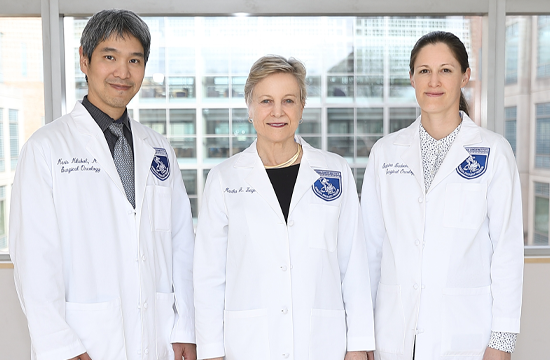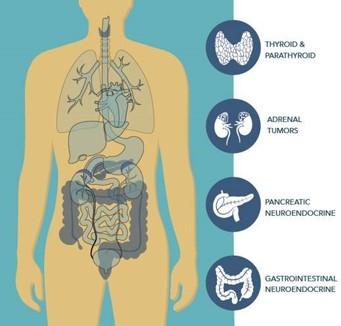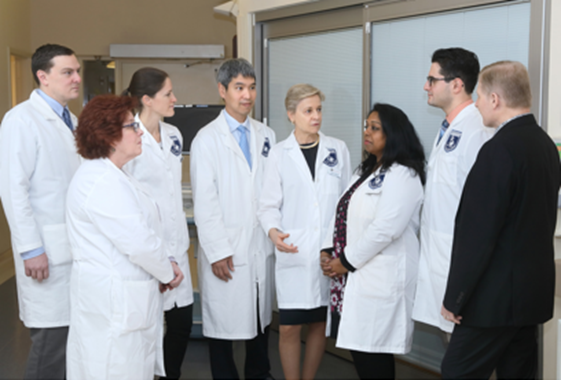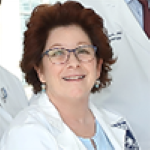Meet our Endocrine Surgeon Experts
To make an in-person or virtual appointment with our team please call 240-858-3020 or email endocrine.surgery@nih.gov.
Visit the links below to learn more about the types of cancer we treat.
Endocrine Tumors
Thyroid cancer: Papillary, Follicular, Anaplastic, Medullary
Parathyroid cancer & adenoma
Adrenocortical cancer
Pancreatic neuroendocrine tumors
Small bowel neuroendocrine tumors
Familial Syndromes
Multiple Endocrine Neoplasia Syndromes: (MEN)1, MEN 2A and B
Hyperparathyroid-Jaw-Tumor syndrome
Von Hippel-Lindau syndrome
Paraganglioma-Pheochromocytoma syndrome
Succinyl dehydrogenase syndromes
Our Mission
Our mission is to improve the longevity and health of our patients at risk for or those with surgical endocrinopathy and endocrine tumors.The endocrine surgeon-scientists at the NIH specialize in common and rare endocrine tumors as well as inherited endocrine tumor syndromes involving the thyroid, parathyroid, adrenal, gastrointestinal tract, and pancreas.
Our Endocrine Surgery team delivers high-quality care to patients with endocrine tumors in the setting of innovative clinical trials. At the NIH, patients will benefit from a multi-disciplinary approach by renowned experts in the fields of endocrine surgery, endocrinology, radiation therapy, nuclear medicine, interventional radiology and more. Our multidisciplinary teams provide a wide range of patient care from standard of care diagnostics and treatments in natural history observation protocols to cutting-edge molecular diagnostics and imaging studies, state-of the-art surgical procedures, as well as targeted drug therapies in patients with advanced diseases. Members of our team have partnered together in-patient care for more than ten years. It is our seamless and integrated approach to cancer treatment as well as cutting edge clinical protocols and innovative research that provides the greatest benefit to our current and future patients.
The NIH Clinical Center - America's Research Hospital
The NIH Clinical Center, located in Bethesda, Maryland, is the world’s largest hospital fully dedicated to clinical research. Through clinical research, promising discoveries in the laboratory are translated into better health and health care for all.
- Currently, there are about 1,500 clinical research studies at the NIH Clinical Center.
- About half are studies of the natural history of disease, especially rare diseases. What researchers learn by studying rare diseases often adds to the basic understanding of common diseases.
- Most other studies are clinical trials, which often are the first tests of new drugs and therapies in people. The clinical trials at the NIH Clinical Center are predominantly Phase I and Phase II, often first-in-human to test safety and efficacy.
Learn more about the NIH Clinical Center
For Newly Enrolled Patients
The NIH Clinical Center Patient Portal is a secure website that connects you to important resources. The Patient Portal is designed to provide you with access to key medical information regarding care you received at the Clinical Center, including test results.
Visitor Information
Getting to NIH and the Clinical Center
Getting around the Clinical Center
NIH Campus Access and Security
Clinical Center Telephone Numbers
Hotels/Motels
Resources for New Patients
Special Campus Access
Patient Services
Patient Handbook
For Patients and Their Families
Visa and Immigration Information
Caregiver Resources
The Edmond J. Safra Family Lodge at NIH
Frequently Asked Questions
-
Am I eligible?
You are eligible to have an in-person or virtual consultation if you have a tumor of the gastrointestinal tract.
-
How will I benefit by participating?
You will be seen by NIH experts in endocrine tumors (thyroid, parathyroid, adrenal, gastrointestinal tract and pancreas) as well as a myriad of rare endocrine tumor syndromes.
Patients will receive care from experts in the fields of surgical oncology, endocrine surgery, gastroenterology, endocrinology, medical oncology, radiation therapy, interventional radiology and more. We would like to emphasize that it is not our intention to take over your care from your primary physician. However, the number of experts from different fields who are thinking about the specifics of your medical history may allow us to make recommendations to your treating physician, with the goal of improving your health. -
Will this clinic benefit others?
The contribution that your visit to this clinic will make to the care of others cannot be emphasized enough. Our philosophy is that the opportunity to evaluate patients with cancer will help the medical community understand the mechanisms that underlie these diseases. We will have the opportunity to compile details of your history, response to prior treatments, radiographic assessments and molecular studies. The data for a single patient may not provide much insight. However, when combined with that of all other patients, the information will generate many leads to help us better understand the genetic and clinical elements of gastrointestinal cancers.
-
What is the goal of the clinic?
The data that we obtain from these clinics will help us to design innovative treatment protocols. These protocols may have a biological component (to see which biochemical pathways are activated in the tumor), a molecular component (to determine which genes are disrupted), a radiographic component (to assess different imaging modalities) and a pharmacokinetic component (to see if drug levels in your body are appropriate). Your oncologist will remain in charge of your care. Our role will be to help provide any elements of your care that may not currently be available at your hospital.
-
How do I make an appointment?
To make an in-person or virtual appointment with our team please call 240-858-3020 or email endocrine.surgery@nih.gov.
Naris Nilubol, M.D.
Physician Scientist Early Investigator
Chief of Endocrine Surgery
naris.nilubol@nih.gov
Samira Sadowski, M.D.
Physician Scientist Early Investigator, Endocrine Surgery
samira.sadowski@nih.gov
Elizabeth Martin
Patient Care Coordinator
elizabeth.martin4@nih.gov
Martha Zeiger, M.D.
Adjunct Investigator
martha.zeiger@nih.gov
Kristine Joy Villaruel, MS, R.N.
Research Nurse
kristinejoy.villaruel@nih.gov







